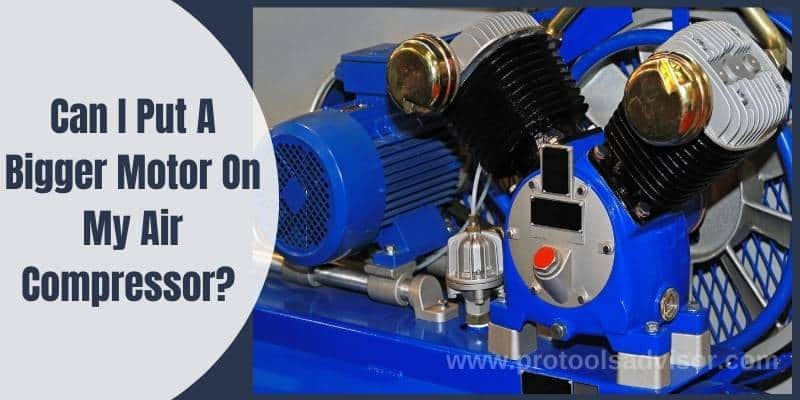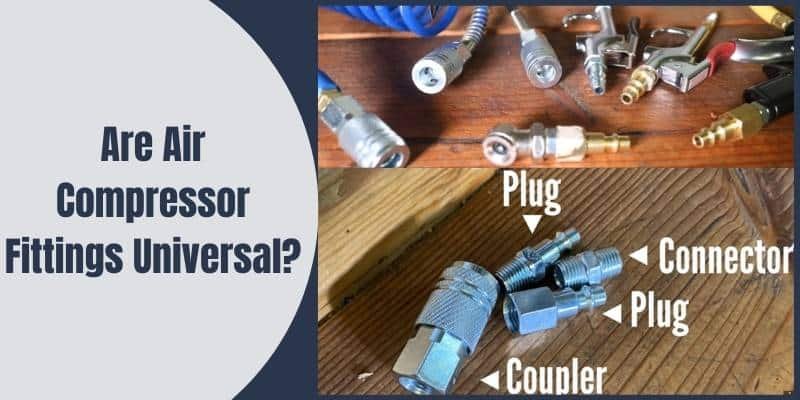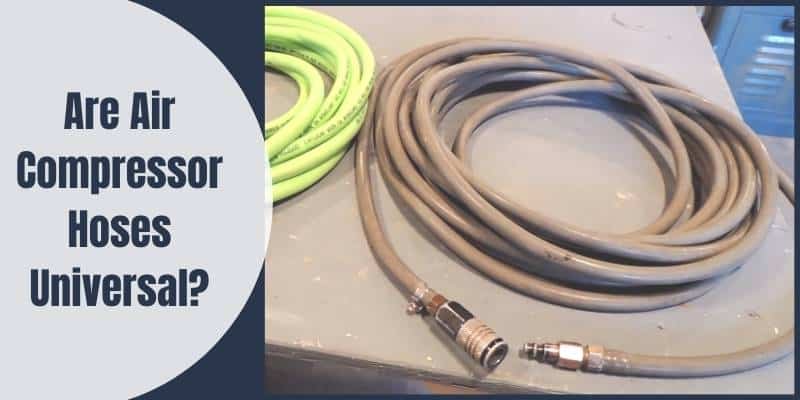Disclosure: This post contains affiliate links and I will be compensated if you make a purchase after clicking through my links. Learn More
For many people, an air compressor is an essential tool. Whether you use it for DIY projects around the house or for work-related tasks, a compressor can make your life a lot easier. But what happens when your air compressor motor starts to go bad?
Can you simply put a bigger motor and keep using the same compressor, or do you need to buy a new one altogether? The answer to this question depends on a few factors such as the make and model of your air compressor, as well as the severity of the problem.
If your motor is simply old and worn out, it might be time for a replacement. But if you’re having serious trouble with your air compressor motor such as a blown capacitor or burned-out winding, then upgrading to a higher-horsepower motor might be the best option.
That’s not the end of the story though. There are a few important bits of information you need to know before deciding on the motor upgrade. Let’s discuss all of them in several sections below.

Can I Put a Bigger Motor on My Air Compressor?
If you’re looking to increase the power of your air compressor, you may be wondering if you can simply swap out the motor for a bigger one. The answer is – it depends on the specific model of the air compressor and whether or not the manufacturer designed it to be upgradeable. Check your air compressor’s manual or contact the manufacturer directly to see if they offer any options for increasing the power of your unit.
Generally, if you have an older air compressor with a small tank, then upgrading will not be worth the investment. On the other hand, if you have a newer model with a relatively larger tank, then upgrading could help increase its performance. You could get more power and even run multiple tools at the same time.
If you decide to upgrade, make sure that the new motor is compatible with all other parts of your air compressor. Incompatible components can lead to serious problems, including fires. For instance, if the size of your air compressor is too small, then putting a bigger motor on it may do more harm than good. The new motor needs to fit onto your air compressor.
You also need to pay attention to the voltage and amperage requirements of the new motor; if these differ from your current setup, you may need to upgrade your electrical service as well. Once you’ve confirmed that everything will work together safely, you can install the new motor according to the manufacturer’s guidelines.
With a little bit of research and careful planning, upgrading your air compressor’s motor can be a relatively simple process. If you’re not comfortable performing the installation yourself, be sure to hire a qualified technician. With a little bit of research and careful planning, you can have your new air compressor motor up and running in no time!
How to Match Compressor Pump With the Right Motor?
The compressor pump is only as good as the motor that powers it, so it’s important to select a motor that will provide the power and performance you need. In this section, we’ll discuss how to match your compressor pump with the right motor.
The first thing you need to do is determine the CFM (cubic feet per minute) rating of your desired air compressor. The CFM rating tells you how much air the compressor can move in a minute. It’s important to choose a compressor with a CFM rating that meets or exceeds your needs.
If you have a high-demand application, such as sandblasting, you’ll need a higher CFM rating than someone who only uses their air compressor for occasional tasks like inflating tires. Once you know the CFM rating of your desired air compressor, you can start narrowing down your choices for motors.
The most common type of motor used on air compressors is an electric motor. Electric motors come in various sizes and power levels, so it’s important to select one that matches the CFM rating of your chosen air compressor.
For example, if you have a 2 hp (horsepower) electric motor and want to use it on a 5 CFM rated air compressor, it would be underpowered and would not work properly. Conversely, if you have a 5 hp electric motor and want to use it on a 2 CFM rated air compressor, it would be overpowered and would likely cause damage to the unit over time due to excessive wear and tear.
In general, it’s best to choose a motor that is slightly larger than what is required for your specific application. This will ensure that your chosen motor will be able to handle any unexpected spikes in demand without issue while also providing long-term durability by not running at or near its maximum capacity all the time.
How Does Motor Horsepower Affect Air Compressors?
In general, an air compressor with a higher HP motor will be able to generate more compressed air than a lower HP unit. However, motor spec is not the most important factor to consider when purchasing an air compressor. In reality, there are a number of factors that should be taken into account in order to ensure you’re getting the best possible machine for your needs.
For example, the size of the air compressor is one of the key factors that determine the amount of power it can deliver. Therefore, it’s important to choose an air compressor that is properly sized for the job at hand.
Also while an air compressor with a higher horsepower motor may seem like a good investment, it’s important to keep in mind that bigger is not always better. A too-powerful motor will just waste energy and make your compressor less efficient. Make sure to choose a motor with the appropriate CFM rating for your needs.
How Can I Make My Air Compressor More Powerful?
If your air compressor isn’t as powerful as you need it to be, there are a few things you can do to try and increase its power. First, check that the compressor is properly sized for the task at hand. If it’s too small, it won’t be able to generate enough power.
Second, make sure that the air tank is properly pressurized. If it’s not, the compressor will have to work harder to fill it up, which will decrease its overall power. Finally, check the air intake filter and make sure it’s clean. A dirty filter will restrict airflow and reduce the compressor’s power output.
How Can I Make My Air Compressor Faster?
An air compressor is a machine that uses an electric motor or gas engine to power a device that sucks in air and compresses it. The compressed air is then used to power tools such as drills, paint guns, and impact wrenches. A faster air compressor will have a higher CFM (cubic feet per minute) rating than a slower one.
There are several things you can do to make your air compressor faster. One way to make your air compressor faster is to upgrade the motor. If you have an electric air compressor, you can replace the standard motor with a more powerful one.
This will increase the CFM rating of your compressor and make it faster. If you have a gas-powered air compressor, you can install a bigger engine. This will also increase the CFM rating of your compressor and make it faster.
Another way to make your air compressor faster is to install a larger tank. A larger tank will hold more compressed air, which means that the motor won’t have to work as hard to compress the air. This will reduce the amount of time it takes for the motor to reach its maximum speed, and therefore make your air compressor faster.
You can also increase the speed of your air compressor by installing a bigger pump. A bigger pump will move more volume of air per stroke, which means that it will take less time for the pump to fill up the tank with compressed air. This will also make your air compiler faster.
How to Get More Air Pressure from Compressor?
If you’re looking to get more air pressure from your compressor, there are a few things you can do. First, check the intake filter and make sure it’s clean. A dirty filter will restrict airflow and reduce pressure.
Next, check the discharge valve and make sure it’s open all the way. If it’s partially closed, that will also reduce pressure. Finally, check the unloader valve to make sure it’s functioning properly. If not, that could be causing low pressure as well.
What Type of Motor is Best for an Air Compressor?
When it comes to choosing a motor for an air compressor, there are many factors to consider such as power, efficiency, and cost. In general, however, most air compressors use either induction motors or universal motors.
Induction motors are the more common type of motor used in air compressors. They are typically more efficient and have lower operating costs than universal motors. However, they require more initial investment due to their higher purchase price.
Universal motors are not as common as induction motors but they do have some advantages. They tend to be less expensive upfront and can run on both AC and DC power sources. However, they are generally less efficient than induction motors and may require more maintenance over time.
Are Air Compressor Motors Interchangeable?
An air compressor motor is a vital component of the machine, and it is not interchangeable with other types of motors. The main reason for this is that air compressors require a specific type of oil to lubricate the internals, and this oil is not compatible with other oils used in other types of motors. Additionally, the air compressor motor has a different cooling system than most other motors, which helps to keep the compressed air cool and prevents it from overheating.
Final Words
Some air compressor motors can be upgraded to increase performance. Factors such as the age and condition of the motor, as well as the type of air compressor, will affect whether or not an upgrade is possible. A professional should be consulted to determine if an upgrade is right for your machine. So, can you put a bigger motor on your air compressor? Hopefully, you have got your answer. Leave a comment below if you still have any confusion on the subject. We would love to hear from you. Thanks!


